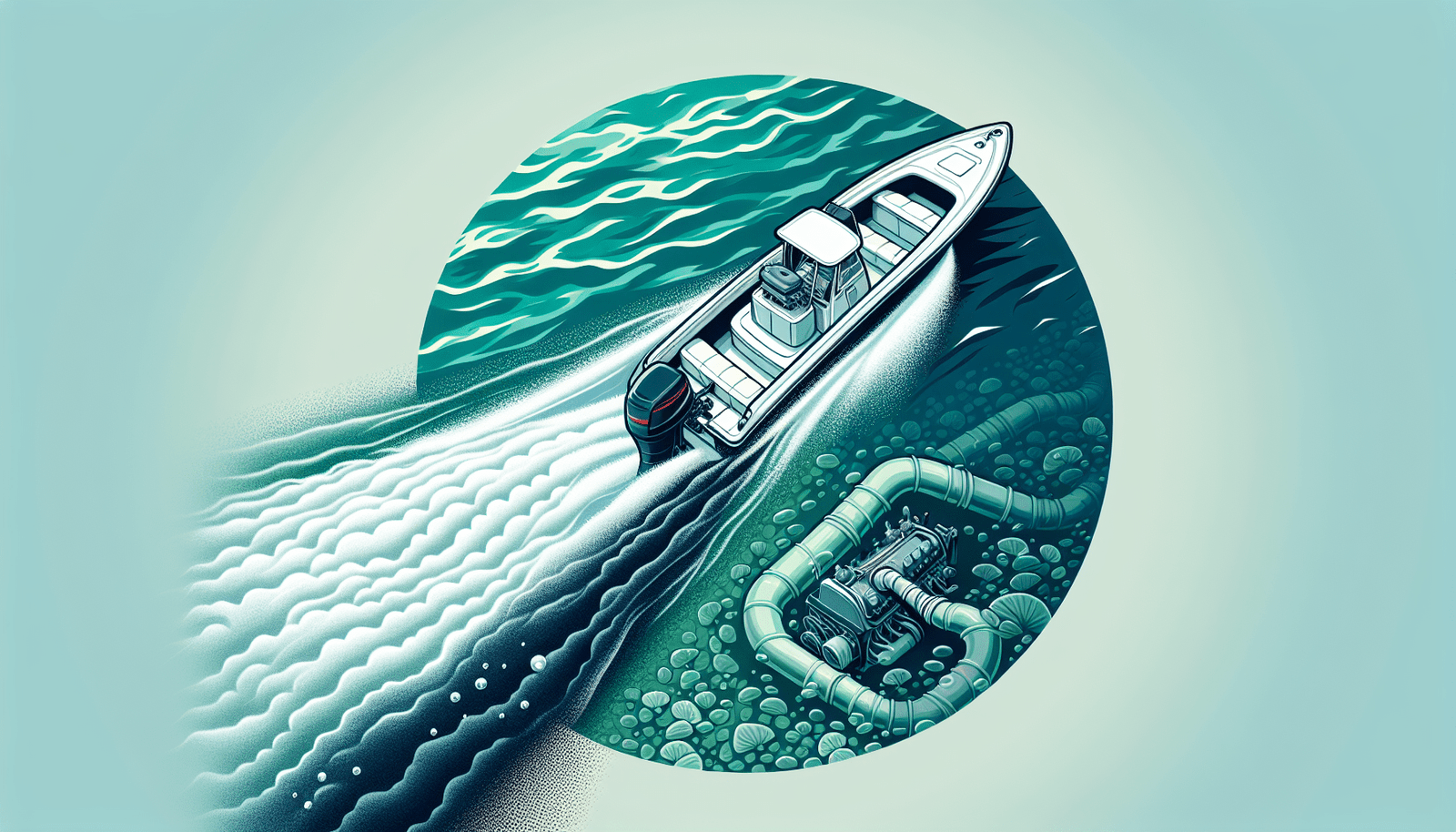How often do you think about the impact of your boat engine on the water environment? In the article, “The Relationship Between Boat Engines And Water Quality,” we explore how your marine adventures can affect water ecosystems in ways that may astound you. Get ready for an engaging discourse on the intricate connection between boat engines and water quality, revealing essential insights about the effects of generated heat, noise, and fuel emissions. So, brace yourself to expand your understanding, re-evaluate habits, and determine changes to promote marine safety while ensuring your boating journeys stay enjoyable.
Understanding Boat Engines
Starting a journey into the world of boating is exciting, but you have to begin somewhere and a good starting point is understanding boat engines. The boat engine is like the beating heart of your boat. It’s responsible for propelling your boat across the water, so it’s crucial that you understand the basics of how it functions, its different types, and how it works.
Basic Functions of Boat Engines
Boat engines share some similar functions with car engines – they combust fuel to produce power. This power is then translated into motion. But instead of moving wheels, as in a car, boat engines turn a propeller or impeller, pushing water out of the way and moving your boat forward. In essence, a boat engine’s main function is to convert fuel into kinetic energy that propels a boat through water.
Different Types of Boat Engines
There are several different types of boat engines, and it’s important to understand the differences. Outboard engines, for instance, are portable, simple to maintain, and perfect for smaller boats. Inboard engines are larger and installed inside the boat’s hull, providing more power and thus suitable for larger boats. Sterndrive engines, also known as inboard-outboards, operate with an interior engine driving an exterior drive, combining features of both the previous types. Jet boat engines, on the other hand, function like jet skis, thrusting water out the back to move forward.
How Boat Engines Work
The basic working principle of boat engines involves the four-stroke combustion cycle: intake, compression, ignition, and exhaust. During the intake stroke, the piston moves downward, and an air-fuel mixture is drawn into the cylinder. The piston then moves upward, compressing the mixture during the compression stroke. The spark plug ignites the compressed fuel-air mixture, causing it to ignite and produce power; this is the ignition stroke. Finally, the piston moves upward again to expel the exhaust gases during the exhaust stroke. This cycle repeats, driving the propeller and moving the boat forward.
Basics of Water Quality
Before we delve into the impacts of boat engines on water quality, let’s take a moment to understand what water quality means.
Definition and Significance of Water Quality
Water quality refers to the physical, chemical, and biological characteristics of water. It’s crucial because it determines the suitability of water for various uses like drinking, recreational activities, and sustaining aquatic life.
Factors Influencing Water Quality
Various factors influence water quality, including temperature, turbidity, levels of dissolved oxygen, pH, salinity, and the presence of pollutants such as oil, chemicals, and garbage. Human activities, including boating, can significantly impact many of these factors, contributing to water pollution and degradation of water quality.
Methods of Measuring Water Quality
Scientists measure water quality using different methods, depending on the type of data needed. They often collect water samples for laboratory analysis – looking at its chemical composition, testing for pollutants, or examining indicator organisms like algae and bacteria. They also use electronic meters to measure parameters like temperature, pH, and dissolved oxygen levels directly in the water body.
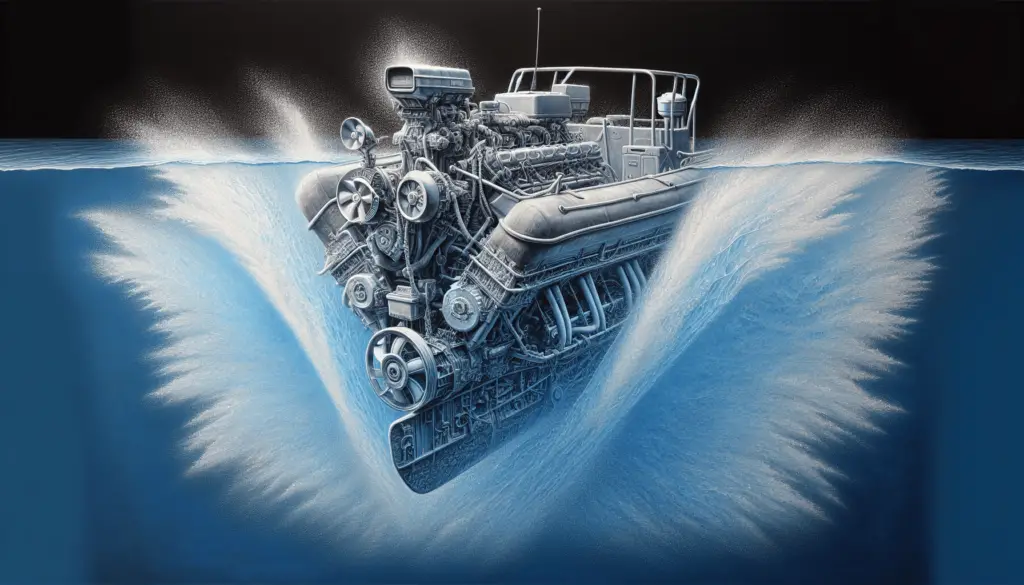
Direct Impacts of Boat Engines on Water Quality
So, how do boat engines directly impact water quality? They can do so in various ways; let’s delve into a few key areas.
Emission of Pollutants from Boat Engines
Boat engines, particularly those that run on gasoline, emit carbon monoxide, hydrocarbons, nitrogen oxides, and particulate matter, all of which can degrade water quality. These pollutants can dissolve into the water, changing its chemical composition and toxic levels, thus affecting the suitability of the water for various uses.
Oil Leakage and Spills from Boat Engine Operations
Oil leaks and spills from boat engines are another threat to water quality. Oil is harmful to aquatic life and can cause long-lasting environmental damage. It forms a film on the water’s surface, inhibiting oxygen exchange and dangerously dropping dissolved oxygen levels necessary for marine life to survive.
Noise Pollution and Water Vibration Caused by Boat Engines
noise pollution and water vibrations aren’t often thought of as pollution, but they have significant impacts on aquatic ecosystems. Boat engines can produce loud noise and vibrations that disturb marine life, altering their behavior and sometimes even leading to physical harm.
Indirect Effects of Boat Engines on Water Quality
Apart from the direct implications, boat engines also indirectly impact water quality in the following ways:
Impact on Aquatic Life
The pollutants emitted by boat engines can harm aquatic life in various ways. They can contaminate their food, interrupt reproduction, and even cause death. Some pollutants can also cause eutrophication, leading to algal blooms that deplete dissolved oxygen levels in the water and cause large-scale aquatic deaths.
Alteration of Water Currents and Stirring of Sediments
Boat engines can alter water currents and stir up sediments. This not only disturbs the habitats of bottom-dwelling organisms but also resuspends pollutants and nutrients that have settled on the sea or river bed, leading to increased turbidity and potential algal blooms.
Effects on Oxygen Levels in the Water
By stirring up sediments and causing algal blooms, boat engines can indirectly lead to decreased oxygen levels in the water, which can be deadly for aquatic life.
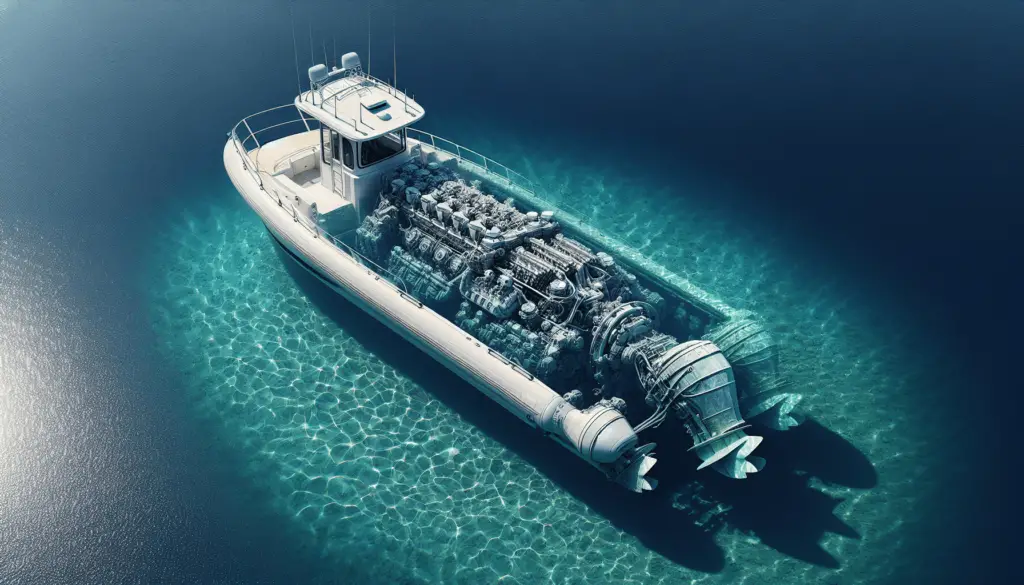
Boat Engine Emissions and Chemical Pollution
Unsurprisingly, boat engine emissions contribute to chemical pollution in water bodies. From carbon monoxide to hydrocarbons, the type of chemicals emitted can vary and so do their effects.
Types of Harmful Chemicals Emitted
Boat engines, predominantly powered by gasoline or diesel, emit a cocktail of harmful chemicals. These include carbon monoxide, nitrogen oxides, particulate matter, and unburned hydrocarbons. Each of these pollutants can harm water quality and aquatic life in various ways.
Effects of Chemical Pollutants on Water Quality
When these chemicals enter the water, they alter its chemistry, often making it more acidic or nutrient-rich thus sparking harmful algal blooms. This chemical shift can make the water inhospitable for many types of aquatic life, from small plankton and fish larvae up to large fish and mammals.
Long Term Impacts of Chemical Build-Up
The long-term effects of chemical build-up due to boat engine emissions aren’t fully understood but are a cause for concern. Over time, these chemicals can accumulate, potentially causing chronic effects on marine life, disrupting the food chain, and even affecting human health.
Role of Fuel Types in Water Quality Degradation
The type of fuel you choose for your boat can play a role in water quality degradation. Some fuels are more polluting than others, so choosing wisely can reduce your boat’s impact on water quality.
Comparison Between Different Fuel Types
Traditional gasoline and diesel fuels are high-pollutants, emitting harmful compounds like hydrocarbons and nitrogen oxides when burnt in boat engines. Meanwhile, biofuels are considered a cleaner alternative, typically producing less harmful emissions.
Impact of Fuel Type on Water Quality
The fact remains – the type of fuel you use affects the chemicals your boat emits, which subsequently impacts water quality. Traditional fuels contribute to acidification, eutrophication, and the spread of toxic compounds in water bodies.
Eco-Friendly Fuel Alternatives
If you’re committed to responsible boating, then considering eco-friendly fuel alternatives is a must. Biofuels, which are derived from plant and animal materials, produce fewer harmful emissions and are renewable. Similarly, electric boat engines, while more expensive, produce zero emissions, making them an excellent option for reducing the impact on water quality.
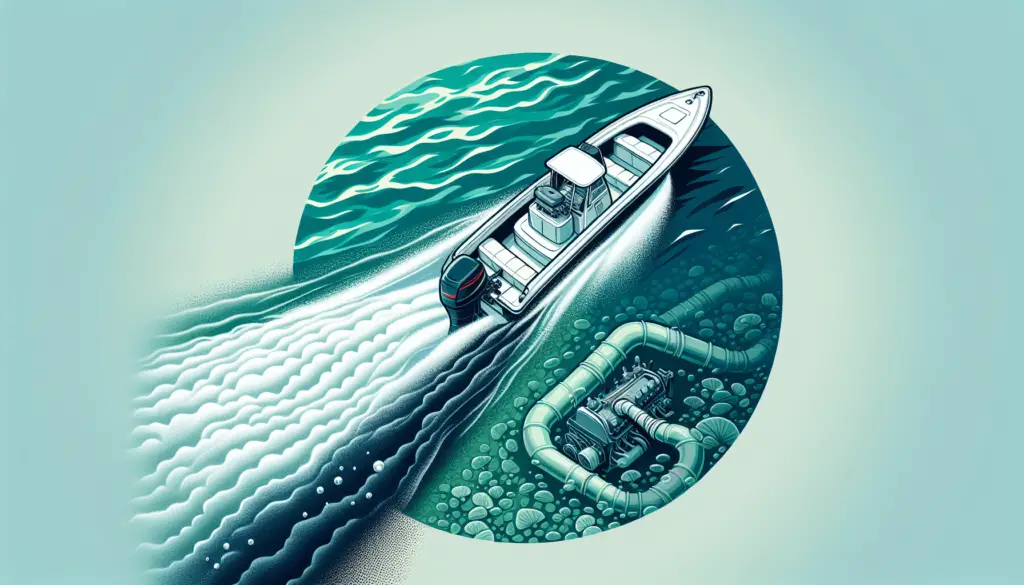
Regulations and Policies Impacting Boat Engines and Water Quality
Legislation plays a vital role in preserving water quality. Let’s explore some of the regulations on boat engine emissions and how they impact water quality.
Existing Regulations on Boat Engine Emissions
Many countries, including the United States and countries across the European Union, have regulations in place to limit boat engine emissions. These regulations often set strict emission standards for new engines and sometimes mandate the use of specific types of less-polluting fuels.
Impact of Policy and Regulations on Water Quality
By controlling the emissions from boat engines, these policies and regulations play a crucial role in limiting the degradation of water quality. They encourage technological innovation, ensure responsible boating practices, and ultimately safeguard our precious water resources.
Potential for Policy Improvements
While the existing regulations have made significant strides in protecting water quality, there’s always room for improvement. Stricter emission standards, better enforcement, incentives for using eco-friendly fuels, and educational programs could all enhance the impact of regulations on water quality.
Technological Improvements and Innovations
Thankfully, the fight for better water quality doesn’t end at policies. Scientists and engineers are continuously coming up with advancements in boat engine technology.
Advancements in Boat Engine Technology
From improvements in fuel efficiency to reductions in emissions, the world of boat engine technology has seen significant advancements in recent years. One promising development is the redesign of engines to reduce oil leaks and emissions, leading to a lesser environmental impact.
Innovations for Reducing Engine Emissions
There are several technologies in the pipeline for reducing boat engine emissions. These range from using electric power to drive boats to utilizing hydrogen fuel cells and hybrid technologies. These innovations have the potential to significantly decrease the pollution from boat engines.
Impact of New Technologies on Water Quality
By reducing the amount of harmful substances emitted into the water, these new technologies can help restore and maintain water quality. They offer hope for a future where we can enjoy our boating activities without compromising the health of our water bodies.
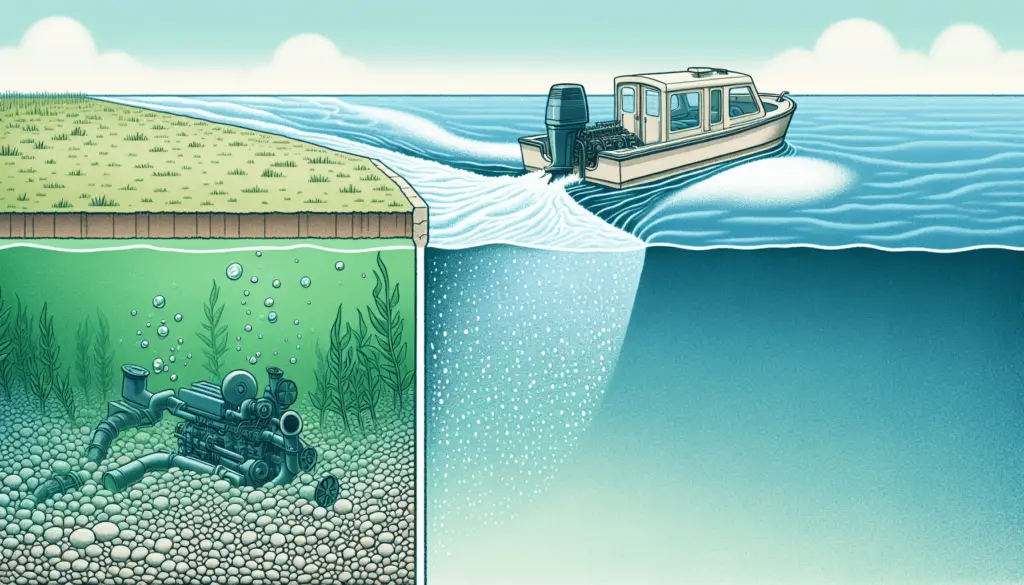
Promoting Responsible Boating Practices
Protecting water quality isn’t just the job of policymakers and scientists – we all have a role to play.
Education and Awareness Among Boat Operators
One of the essential tools in protecting water quality is education. By being aware of the impact of your boat engine on the water, you can make more informed choices about your boating practices. This might mean choosing a more eco-friendly fuel, maintaining your boat engine regularly, or supporting stricter regulations on boat emissions.
Best Practices for Maintaining Boat Engines
Regular maintenance of your boat engine is also essential. This includes monitoring for oil leaks, ensuring your engine is operating at peak efficiency, using the cleanest fuel available, and properly disposing of engine waste and old parts.
Role of Individuals in Preserving Water Quality
Individuals can make a significant difference in preserving water quality. From the choices you make in buying and maintaining your boat to the way you operate it, every little bit helps. Remember, preserving water quality not only protects the environment but also ensures that you can continue enjoying your boating activities for many years to come.
Case Studies on Boat Engines and Water Quality
Let’s look at some real-world examples of how boat engines can impact water quality.
Effects of Commercial Boating on Water Quality
Commercial boating, including shipping and fishing, often involves large boats with potent engines. These engines can emit large amounts of pollutants, leading to severe water quality degradation in busy commercial waterways.
Impacts of Recreational Boating on Local Water Bodies
Recreational boating might seem less impactful, but the sheer number of recreational boats can lead to significant water quality issues, particularly in popular boating destinations. Oil spills, emissions, and noise pollution from recreational boats all contribute to degrading the quality of our beautiful waterways.
Success Stories of Improved Boat Engine Management
Despite the challenges, there are several success stories of improved boat engine management making a real difference. For instance, the introduction of cleaner fuels and stricter emissions regulations in many countries has led to observable improvements in water quality. Similarly, moves towards electric or hybrid technology are promising for the future health of our water bodies.
In conclusion, boat engines play a critical role in the degradation of water quality. However, understanding and mitigating this impact is within our reach. Through responsible boating practices, regulatory action, innovative technology, and increased awareness, we can ensure the preservation of our precious water resources.

